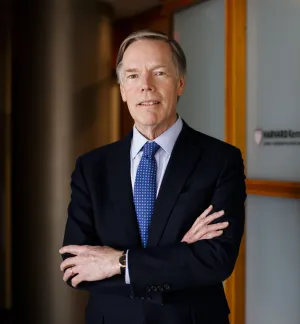My family and I spent Monday at Boston College celebrating the graduation of our youngest daughter. And at Harvard, where I teach, thousands of graduates will parade to Harvard Yard in the annual rite of spring that never fails to remind that our young people are our greatest hope. Late May is an optimistic time when students emerge from commencement ceremonies to make their way in the world. This scene plays out in every American city, but especially here in the citadel of learning, Greater Boston, where higher education is our most vital industry.
Many of this week’s graduates may be too exhausted by round-the-clock celebrations and too distracted by the fanfare to remember much of what their graduation speakers tell them. And it is too much to ask that they focus on their cosmic responsibilities as citizens after receiving their diplomas. But, as we pass the symbolic baton of leadership to them in the years to come, there are at least two great national challenges the graduates will inherit that are worthy of reflection.
The first is to write their unique chapter in the most important work that has consumed Americans since our founding and is our greatest achievement — to advance the cause of human freedom for all our citizens and people around the world. Many graduations are framed by the major events, national and global, that freeze that time in the memories of our students. The 2012 graduates will likely remember three events that mark this as the spring of freedom — the dramatic escape from communism to America of the brave Chinese dissident Chen Guangchang, the struggle for equal rights by gay and lesbian Americans, and the ongoing cause of women’s rights under cynical assault during the Republican primaries.
These stories give this year’s graduates their central charge — to continue the efforts of earlier generations to build what Jefferson called our Empire of Liberty. Many graduates will have reflected on Lincoln’s Emancipation Proclamation, Truman’s integration of the US Armed Forces, and the heroic civil rights campaigns of Martin Luther King and Cesar Chavez. Each generation has tried, sometimes fitfully, to battle discrimination, bigotry, and ignorance, and to extend to all citizens the fundamental rights promised by the Constitution. I am optimistic about this generation of students. In listening to my own daughters and my many students, I have been impressed and encouraged by their absolute opposition to discrimination and support for equal opportunity. We need our young people to be absolutists on these issues of civil rights and to win the great debates ahead to protect women, gays and lesbians, and all disadvantaged Americans as well as continue to stand for freedom wherever it is denied, most notably in China.
The second great challenge for today’s graduates is to fix the sorry breakdown in governance in Washington. That will only occur through painful and difficult compromise by both sides. Partisanship has been part of our politics since Jefferson and Adams tangled bitterly in the race to succeed George Washington. But our current red-blue division has produced a strikingly strident, unyielding, and caustic atmosphere that has prevented our elected officials from resolving the critical differences that underlie our economic crisis — taxation and entitlement programs, including Social Security.
Those who campaign by threatening “my way or the highway” or vow never to compromise when they reach the Congress are ruining our politics. The Tea Party is, by far, the main offender. Its uncompromising attitude would work perfectly in a place like North Korea, where only one line of thinking is permitted, but fails completely in a US federal system that is built on the sharing of power and the necessity of compromise.
It may appear contradictory to ask young people to be both absolutist in their commitment to human freedom and, at the same time, be willing to compromise on important budgetary and regulatory issues. But we cannot compromise when rights are denied to fellow Americans. And we must compromise for the common good on the more prosaic differences that separate us on the budget and functioning of our government. After all, even the conservative icon Edmund Burke argued that “all government, indeed every human benefit and enjoyment, every virtue and every prudent act, is founded on compromise and barter.” Such are the challenges of citizenship and governance that this week’s graduates will now inherit.
Burns, Nicholas. “Two challenges that college graduates will inherit.” The Boston Globe, May 24, 2012





